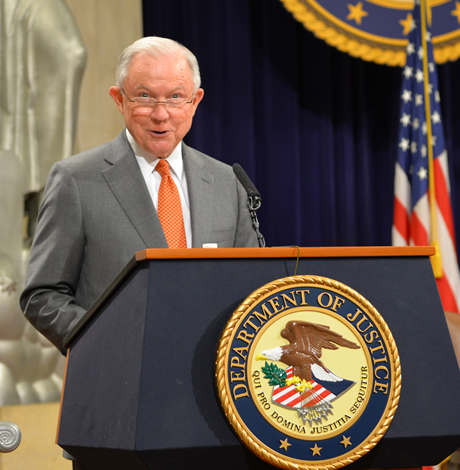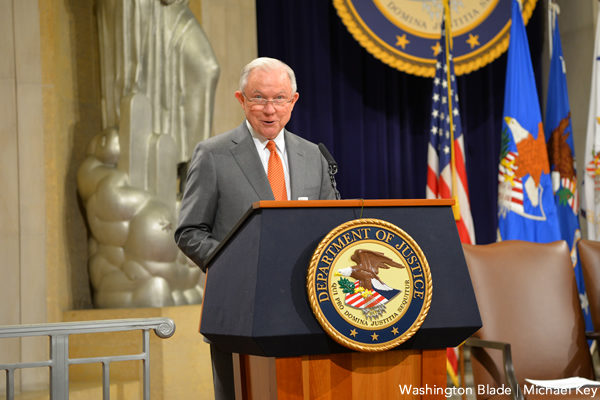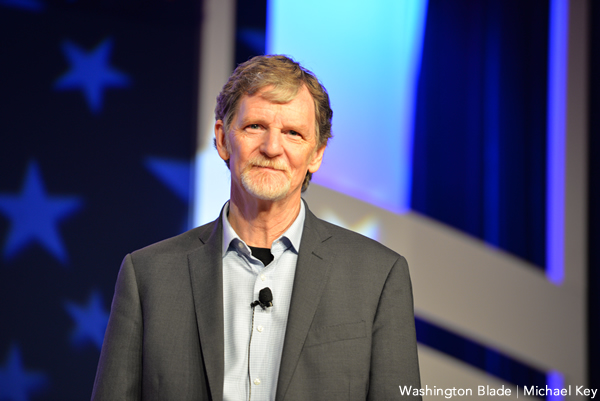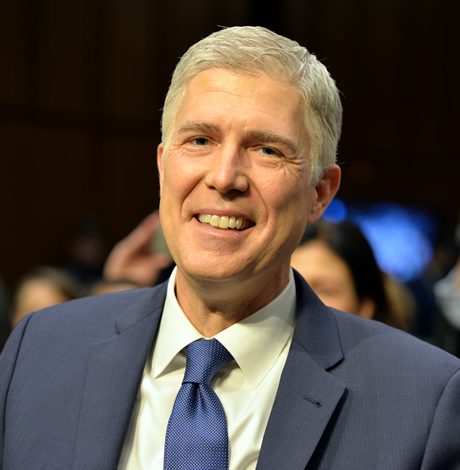News
DOJ touts anti-LGBT views, task force at ‘religious freedom’ summit
Sessions accused of ‘undermining LGBTQ rights’


Attorney General Jeff Sessions announced the creation of a Religious Liberty Task Force. (Washington Blade photo by Michael Key)
A summit at the U.S. Justice Department on Monday ostensibly intended to promote religious freedom, including the creation of a Religious Liberty Task Force, often highlighted efforts to enable anti-LGBT discrimination.
At the summit in the Justice Department’s Great Hall, U.S. Attorney General Jeff Sessions announced the creation of the task force to implement “religious freedom” guidance he issued last year.
“The task force will help the department fully implement our religious liberty guidance by ensuring that all Justice Department components — and we got a lot of components around the country — are upholding that guidance in the cases they bring and defend, the arguments they make in court, the policies and regulations they adopt and how we conduct our operations,” Sessions said.
According to the Justice Department, Sessions will serve as chair of the task force, which will be co-chaired by Acting Associate Attorney General Jesse Panuccio and Associate Attorney General for the Office of Legal Policy Beth Williams.
Sessions said a primary mission of the Religious Liberty Task Force will be ensuring Justice Department employees “know their duty is to accommodate people of faith.”
“This administration is animated by the same American view that has led us for 242 years that every American has a right to believe and worship and exercise their faith in the public square,” Sessions added.
The underlying guidance on which the task force is based seeks to allow individuals and businesses to act in the name of religious freedom — often used as an exercise for anti-LGBT discrimination — without fear of government reprisal. Nowhere in the guidance is there a limiting principle assuring the right to free exercise of religion should be an excuse to engage in anti-LGBT discrimination.
Announcing the new task force, Sessions referenced the Masterpiece Cakeshop case in which a Colorado baker was sued after he refused to make a custom-made wedding cake for a same-sex couple. The U.S. Supreme Court narrowly ruled in his favor based on the facts of his case, citing anti-religion sentiment on the Colorado Civil Rights Commission.
Sessions commended Phillips for having endured an “ordeal faced so gravely,” touting an amicus brief the Justice Department filed on his behalf before the Supreme Court. U.S. Solicitor General Noel Francisco also argued in favor of Phillips before justices in oral arguments.
“Let’s be frank: A dangerous movement, undetected by many, but real, is now challenging and eroding our great tradition of religious freedom,” Sessions said at the start of his remarks. “There can be no doubt, it’s no little matter. It must be confronted intellectually and politically, and defeated.”
LGBT rights supporters said in response to the creation of the Religious Liberty Task Force its purpose was to further the Trump administration’s goal of compromising LGBT rights.
Louise Melling, deputy legal director for the American Civil Liberties Union, said the agenda of the Religious Liberty Task Force “isn’t consistent with religious freedom.”
“Religious freedom protects our right to our beliefs, not a right to discriminate or harm others,” Melling said. “Jeff Session’s Department of Justice is again turning that understanding of religious freedom on its head.”
Lucas Acosta, director of LGBTQ media for the Democratic National Committee, said in a statement the task force is “just the latest assault in this administration’s continued campaign against LGBTQ people and our civil rights.”
“By creating this task force, Sessions is establishing a unit dedicated to undermining LGBTQ rights and giving anti-LGBTQ far-right extremists like task force head Jesse Panuccio a taxpayer-funded platform to push their anti-equality agenda,” Acosta said. “Rather than ensuring every person has equal protections and opportunities, Sessions is shamefully doubling down on bigotry.”
But the creation of the Religious Liberty Task Force was just one portion of the summit, which also included the voices of participants who urged a commitment to religious freedom to advance anti-LGBT discrimination.
Archbishop of Louisville Joseph Edward Kurtz, who formerly served as president of the U.S. Conference of Catholic Bishops, said religious freedom is facing challenges that amount to “power-seeking for the purpose of imposing one’s will on others.”
Kurtz cited as an example Catholic adoption agencies being “targeted for closure” for refusing to place children with LGBT families out of religious objections.
“One of the biggest concerns is the ability of our child welfare providers to continue to be able to place children with foster and adoptive families consistent with our teaching,” Kurtz said.
Although no government is actively seeking to close Catholic adoption agencies, they have threatened to shut their doors on their own in the wake of the legalization of same-sex marriage because they feel they’ll be forced to place children with gay couples who marry.
As a result, a growing number or states have enacted anti-LGBT adoption laws allowing taxpayer-funded agencies to refuse to place children with LGBT families over religious objections. House Republicans have inserted an amendment in a pending appropriations bill that would penalize states and localities for having policies barring anti-LGBT discrimination among adoption agencies.
Phillips, the owner of Masterpiece Cakeshop, was himself present at the summit and took part in a panel of individuals who say they are facing challenges to their religious freedom.
Moderating his panel was Justice Department spokesperson Kerri Kupec, formerly a spokesperson for the anti-LGBT Alliance Defending Freedom. At a time when that term is used as justification for anti-LGBT discrimination, Kupec said in her introduction of the panel religious freedom is often “housed in scare quotes, as if it’s not a real thing, or even worse, a bad thing, which is tragic.”
Much of Kupec’s questioning of Phillips sought to elicit sympathy for him, which meant his act of refusing to make a custom-made wedding cake for a same-sex couple who entered his store was glossed over as he explained his commitment to his religious views.
In addition to refusing to make a same-sex wedding cake, Phillips said his religious beliefs compel him to close on Sundays, refuse to service Halloween celebrations or make cakes with denigrating messages.
“It’s the message of the cake that I evaluate, not the person who ordered the cake,” Phillips said. “In one instance, I had a man who wanted me to make a cake basically telling his boss that he was a jerk, so I wouldn’t do that, but I’ve also had people asked me to do cakes that would disparage gay people, the gay lifestyle, but I wouldn’t do that either because they’re hurtful cakes.”
As the litigation went forward, Phillips said he received death threats as well as a threat over the phone against his daughter. As a result, Phillips said he wouldn’t allow employees to answer the phone at Masterpiece Cakeshop and would only take calls himself.
Noting the U.S. Supreme Court only takes a few select cases each year, Phillips became emotional when he recalled news that justices had agreed to take up his petition after the state of Colorado ruled against him.
Even though the result of the case was narrowly in his favor and didn’t open up a First Amendment right for anti-LGBT discrimination, Phillips said it was worth the effort.
“True tolerance has to be a two-way street,” Phillips said. “We’re thrilled that the United States ruled in our favor, this ruling solidifying religious freedom in our country, but it’s not just for me, it’s for all us, every American should now be able to live and work freely and according to their conscience without fear of punishment from the government.”
Other speakers at the summit expressed concerns about threats to religious minorities in a manner that progressives would likely agree is a threat to religious freedom.
Among them was Harpreet Singh, who works with Muslim, Arab, Sikh, South Asian and Hindu religions on behalf of the Justice Department, and Asma Uddin, senior scholar at the Religious Freedom Center of the Freedom Forum Institute, who talked about anti-Muslim sentiments.
Singh said his agency has found hate crimes against minority religions have been increasing, which he said is substantiated by the Federal Bureau of Investigation’s annual reports and studies from universities, although “there’s a lot of underreporting going on.”
But other speakers on the panel railed against efforts to uphold LGBT rights as they face compromise in the name of religious freedom, including Emilie Kao, director of the Richard & Helen DeVos Center for Religion & Civil Society at the anti-LGBT Heritage Foundation.
Kao was critical of litigation filed by the ACLU against the Michigan law enabling Catholic adoption agencies to refuse placement to LGBT families over religious objections.
Asserting same-sex couples seeking to adopt face no problem in access to adoption, Kao said the plaintiff in the lawsuit drove past four other adoption agencies to reach St. Vincent’s Catholic Charities, which she said “still holds the belief that they should put every child with a mother and father.”
“The lesbian couple says they were personally offended by St. Vincent’s not placing a child with them,” Kao said. “I think it’s important for us to recognize that throughout the history of our country and the Supreme Court’s cases, we have always protected the right of people to follow their religious beliefs, and we’ve never protected the right not to have your feelings hurt.”
Michael McConnell, a law professor at the Constitutional Law Center at Stanford University, warned of the growing compromise that religious liberty faces in the wake of growing “sexual freedom.”
“An extremely popular argument in religious circles has been that religious accommodations are necessarily unconstitutional if they lead to so-called third-party harm,” McConnell said. “If there’s anyone whose rights or interests…are interfered with, that that means the accommodation is simply unconstitutional. To my mind, that’s an extremely implausible argument because virtually every accommodation, and indeed, virtually any application of any constitutional right — free speech, property, due process — there’s always someone on the other side of ledger who’s interests are being harmed.”

South Africa National Assembly Speaker Thoko Didiza on June 17 swore in lesbian feminist Palomino Jama as a new MP.
Jama joins other LGBTQ legislators — including Public Works and Infrastructure Minister Dean Macpherson; Forestry, Fisheries and the Environment Minister Dion George; and Deputy Women, Youth, and Persons with Disabilities Minister, Steve Letsike.
Jama said she will work hard and excel as MP.
“What a great moment to be alive. Thank you youth of 1976, thank you Simon Nkoli, Phumi Mthetwa, Paddy Nhlaphos, Vanessa Ludwig, and others for what you did for the LGBTI people in the 80s and 90s. Lastly, for the fierce fist of the Jamas to always hit where it matters for the people of this country,” said Letsike.
Embrace Diversity Movement, a local LGBTQ organization, said Jama’s inauguration came at an appropriate time, during Pride month.
“Her swearing-in took place during a month of profound significance in June, which marks both international Pride Month and Youth Month in South Africa,” said the group. “Palomino is a seasoned queer activist and dedicated community builder with a distinguished record of leadership and service.”
“The EDM proudly supports Palomino in her deployment to parliament, her presence meaningfully advances youth and queer representation in public office,” added the Embrace Diversity Movement. “We are confident that she will serve the people of South Africa with integrity, courage, and distinction.”
South Africa is the only African country that constitutionally upholds LGBTQ rights. There are, however, still myriad challenges the LGBTQ community faces on a daily basis that range from physical attacks to online abuse.
Letsike in May faced a barrage of online attacks after she released a scathing statement against popular podcaster Macgyver “MacG” Mukwevho, who during a podcast episode in April insinuated that the reason behind popular socialite Minnie Dlamini’s “unsuccessful” relationships were probably due to the bad odor from her genitals.
Letsike, who viewed MacG’s comments as offensive, called for the podcaster to be summoned before parliament’s Portfolio Committee on Women, Youth, and Persons with Disabilities and criticized the local television station that aired the podcast.
X users and other social media subscribers bombarded Letsike with anti-lesbian comments. She, however, was unphased.
Letsike continues to face anti-lesbian comments, even though MacG apologized and the television station on which his podcast had aired cancelled its contract with him.
Israel
Activist recalls experience in Tel Aviv after Israel-Iran war began
Marty Rouse was part of Jewish Federations of North America Pride mission

A long-time activist who was in Israel last month when its war with Iran began has returned to D.C.
Marty Rouse traveled to Israel on June 6 with the Jewish Federations of North America. The 5-day mission ended the night before the annual Tel Aviv Pride parade was scheduled to take place.
Mission participants met with Israeli President Isaac Herzog and several LGBTQ activists in Tel Aviv and Jerusalem. They visited the Western Wall, the Nova Music Festival site, and Nir Oz, a kibbutz in southern Israel that is less than a mile from the country’s border with the Gaza Strip. Mission participants also visited Sderot, a city that is roughly a mile from the Hamas-controlled enclave, a veterans rehabilitation facility, a new LGBTQ health center and the Aguda: The Association for LGBTQ Equality in Israel in Tel Aviv.
Hamas militants on Oct. 7, 2023, killed upwards of 360 partygoers and kidnapped dozens more at the music festival that was taking place at a campground near Re’im, a kibbutz that is roughly 10 miles southwest of Nir Oz. The militants killed or took hostage nearly a quarter of Nir Oz’s residents. They also took control of Sderot’s police station.

Tel Aviv Deputy Mayor Chen Arieli spoke at the mission’s closing party that took place at the Sheraton Grand, a hotel that overlooks Tel Aviv’s beachfront, on June 12.
Rouse and other mission participants planned to stay in Tel Aviv for the Pride parade, which was scheduled to take place the following day. He and Gordie Nathan, another mission participant who lives in Palm Springs, Calif., had checked into a nearby hotel that was less expensive.
“We said our farewells,” recalled Rouse when he spoke with the Washington Blade in D.C. on June 24. “We went to our hotels, and we get the warning, and then all hell broke loose.”
Israel early on June 13 launched airstrikes against Iran that targeted the country’s nuclear and military facilities.
Rouse said mission organizers told him and other participants who remained in Tel Aviv to meet at the Sheraton Grand for breakfast and dinner — Israel’s airspace was closed in anticipation of an Iranian counterattack, and authorities cancelled the Pride parade.
He said he went to bomb shelters at least twice a night for three nights.
Israel’s Home Front Command during the war typically issued warnings about 10 minutes ahead of an anticipated Iranian missile attack. Sirens then sounded 90 seconds before an expected strike.
Rouse and Nathan walked to the Sheraton Grand on June 13 when the Home Front Command issued a 10-minute warning. They reached the hotel in a couple of minutes, and staff directed them to the bomb shelter.
“You know to walk slowly, everything’s fine,” recalled Rouse. “You get 10 minutes, so everything was fine when the alarm goes off.”
Rouse described the Sheraton Grand shelter as “well lit” with WiFi, a television, and air conditioning. He was watching an Israeli television station’s live coverage of the Iranian missile attack when he saw one hit an apartment building in the Tel Aviv suburb of Ramat Gan.
A 74-year-old woman died and her boyfriend was seriously injured.
“I go over to look at the TV, just to watch,” recalled Rouse. “All of a sudden, you watch, and you see one bomb go and land and explode in Tel Aviv on TV. It landed and blew up.”
“I was like, okay, this is real, and so that was scary,” he added.
Rouse said the bomb shelter in the hotel where he and Nathan were staying after the mission ended was far less comfortable.
“It was dark. It was humid. It was hot. It was very uncomfortable,” said Rouse. “You really felt alone.”

Rouse and nearly everyone else on the mission who were in Tel Aviv when the war began left Israel on June 15. They boarded buses that took them to the Jordanian capital of Amman, which is a roughly 2 1/2-hour drive from Tel Aviv through the West Bank.
Rouse described the trip as “like a field trip” until they drove across the Jordan River and arrived at the Jordanian border crossing.
“You walk into this room, and instead of being in a well air-conditioned airport, you’re in this hot, humid, small place in the middle of the desert, packed with people, and those big, large, loud fans and pictures of military people on the walls,” he said. “It was almost like a Casablanca kind of feeling.”
Rouse said Jordanian authorities brought mission participants through customs in groups of 10. A Jewish Federations of North America liaison from Amman who previously worked as a tour guide for A Wider Bridge — a group that “advocates for justice, counters LGBTQphobia, and fights antisemitism and other forms of hatred” — went “behind closed doors” to ensure everyone was able to enter the country.
“It took a really long time,” Rouse told the Blade.

Mission participants arrived in Amman a short time later. They checked into their hotel and then had dinner at a restaurant.
“Now we feel like we’re safe and we’re in Amman,” recalled Rouse. “We’re sitting outside having a beautiful dinner.”
Iranian missiles passed over Amman shortly after Rouse and the other mission participants had begun to eat their dessert. They went inside the restaurant, and waited a few minutes before they boarded busses that brought them back to their hotel.
“No one was openly freaking out, which I was surprised by,” said Rouse.
The group was scheduled to fly from Amman to Cairo at 11 p.m. local time (4 p.m. ET) on June 16. They visited Jerash, an ancient city north of Amman, before their flight left Jordan.
“[The Jerash trip] actually took our minds off of everything,” said Rouse.
A Jewish Federations of North America contact met Rouse and the other mission participants at Cairo’s airport once their flight landed. Rouse arrived at JFK Airport in New York on June 17.
Trump-announced ceasefire ended 12-day war
President Donald Trump on June 23 announced a ceasefire that ended the 12-day war.
The U.S. three days earlier launched airstrikes that struck three Iranian nuclear sites. The ceasefire took effect hours after Iran launched missiles at a U.S. military base in Qatar.
Iran said the war killed more than 900 people in the country.
The Associated Press notes Iranian missiles killed 28 people in Israel. One of them destroyed Tel Aviv’s last gay bar on June 16.
The war took place less than two years after Oct. 7.
The Israeli government says Hamas militants on Oct. 7, 2023, killed roughly 1,200 people on that day when it launched its surprise attack on the country. The militants also kidnapped more than 200 people.
The Hamas-controlled Gaza Health Ministry says Israeli forces have killed nearly 55,000 people in the enclave since Oct. 7. Karim Khan, the International Criminal Court’s chief prosecutor, has said Israeli Prime Minister Benjamin Netanyahu and former Hamas leader Yahya Sinwar, who the IDF killed last October, are among those who have committed war crimes and crimes against humanity in Gaza and Israel.

Rouse upon his return to the U.S. said he “was never as aware of the comfort of another human being than I was during that time.” Rouse affectionately called Nathan his “bomb shelter boyfriend” and even questioned the way he reacted to the missile alerts.
“He’s sitting on the edge of the bed and he goes, okay, I’m going to put on my socks and my shoes, and I say, really? You’re going to put on your socks,” Rouse told the Blade. “The fact that I was nervous, that putting on socks might have changed the direction of our lives, to me was like I can’t believe I said that to him.”
Rouse quickly added Nathan helped him remain calm.
“If I was by myself, those nights would have been long enough,” said Rouse. “It’s a totally different feeling to be with another human that you know than to be by yourself.”

Rouse also praised the Jewish Federations of North America.
“JFNA really sprung into action and started to figure out all options to get us all safely home,” said Rouse. “It was all about logistics. Staff worked around the clock identifying and then mobilizing to get us back to the states. It was a great team effort and I know I speak for everyone in expressing our deep appreciation for their dedication to getting us safely home.”
Congress
Congress passes ‘Big, Beautiful Bill’ with massive cuts to health insurance coverage
Roughly 1.8 million LGBTQ Americans rely on Medicaid

The “Big, Beautiful Bill” heads to President Donald Trump’s desk following the vote by the Republican majority in the U.S. House of Representatives Thursday, which saw two nays from GOP members and unified opposition from the entire Democratic caucus.
To partially offset the cost of tax breaks that disproportionately favor the wealthy, the bill contains massive cuts to Medicaid and social safety net programs like food assistance for the poor while adding a projected $3.3 billion to the deficit.
Policy wise, the signature legislation of Trump’s second term rolls back clean energy tax credits passed under the Biden-Harris administration while beefing up funding for defense and border security.
Roughly 13 percent of LGBTQ adults in the U.S., about 1.8 million people, rely on Medicaid as their primary health insurer, compared to seven percent of non-LGBTQ adults, according to the UCLA School of Law’s Williams Institute think tank on sexual orientation and gender identities.
In total, the Congressional Budget Office estimates the cuts will cause more than 10 million Americans to lose their coverage under Medicaid and anywhere from three to five million to lose their care under Affordable Care Act marketplace plans.
A number of Republicans in the House and Senate opposed the bill reasoning that they might face political consequences for taking away access to healthcare for, particularly, low-income Americans who rely on Medicaid. Poorer voters flocked to Trump in last year’s presidential election, exit polls show.
A provision that would have blocked the use of federal funds to reimburse medical care for transgender youth was blocked by the Senate Parliamentarian and ultimately struck from the legislation — reportedly after the first trans member of Congress, U.S. Rep. Sarah McBride (D-Del.) and the first lesbian U.S. senator, Tammy Baldwin (D-Wis.), shored up unified opposition to the proposal among Congressional Democrats.
-

 U.S. Supreme Court3 days ago
U.S. Supreme Court3 days agoSupreme Court to consider bans on trans athletes in school sports
-

 Out & About3 days ago
Out & About3 days agoCelebrate the Fourth of July the gay way!
-

 Virginia3 days ago
Virginia3 days agoVa. court allows conversion therapy despite law banning it
-

 Federal Government5 days ago
Federal Government5 days agoUPenn erases Lia Thomas’s records as part of settlement with White House










